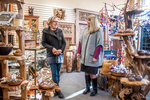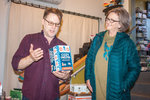Downtown Port Townsend merchants showed off their preparations for the upcoming “Small Business Saturday” after Thanksgiving, as visitors from the U.S. Small Business Administration (SBA) …
This item is available in full to subscribers.
We have recently launched a new and improved website. To continue reading, you will need to either log into your subscriber account, or purchase a new subscription.
If you had an active account on our previous website, then you have an account here. Simply reset your password to regain access to your account.
If you did not have an account on our previous website, but are a current print subscriber, click here to set up your website account.
Otherwise, click here to view your options for subscribing.
* Having trouble? Call our circulation department at 360-385-2900, or email our support.
Please log in to continue |
|



Downtown Port Townsend merchants showed off their preparations for the upcoming “Small Business Saturday” after Thanksgiving, as visitors from the U.S. Small Business Administration (SBA) were treated to a whirlwind two-hour tour of the shops along Water Street during the morning of Nov. 20.
QUIMPER MERCANTILE COMPANY
SBA Seattle District Director Kerrie Hurd and Economic Development Specialist Lisa White were joined by Port Townsend Mayor Deborah Stinson, former Team Jefferson Economic Development Council (EDC) Director Peter Quinn and current EDC Director Brian Kuh, and Port Townsend Main Street Program Executive Director Mari Mullen, as they made their first stop on the tour, the Quimper Mercantile Company, where they were greeted by Quimper Merc General Manager Holly Mayshark.
Quinn and Stinson expressed pride in being part of the original team that started up the community-owned Quimper Mercantile in 2012, and Quinn added that the Merc has been profitable since its second year.
“It’s considered one of the anchor stores of our downtown,” said Quinn, who serves as CEO of the Quimper Mercantile Company. “It offers everyday things for everyday people.”
“And we support other local businesses,” Mayshark said, elaborating that, if the Merc doesn’t have what a shopper is looking for, its employees will suggest other stores where those items might be found.
Hurd compared the Quimper Mercantile to a combination of Cabela’s, REI and a general store, with a diversity of products ranging from art supplies to baby items.
“I could just feel the culture of this community as I walked in the door,” Hurd said.
Mayshark agreed with Hurd that the Merc “covers a lot of ground” by offering “a little bit of everything.”
In addition to setting up the store’s holiday displays, and kicking off 40% to 50% sales starting on “Black Friday,” Mayshark explained the longstanding policy that shoppers who are residents of Jefferson, Clallam and Island counties, who spend $100 at the store, receive a 5% discount forever.
Kuh pointed out the role that the EDC has played, especially during Quinn’s tenure as director, in advising prospective local small business owners on how to get started, in areas ranging from licensing and investment, to securing a cumulative $10 million in capital throughout Jefferson County over the past decade.
“We appreciate active grassroots organizations like yours, since that’s who the SBA partners with,” Hurd said.
Kuh extended an invitation to the SBA to use the business resource center that’s co-located with the Jefferson County Chamber of Commerce at the Port Townsend Visitor Center Plaza.
“Those business resource offices are basically an extension of the SBA, so make use of them any time you need them,” Kuh said.
WHISTLE STOP TOYS
Steve Goldenbogen told Hurd he was able to start Whistle Stop Toys in Port Townsend nine years ago with an SBA Express-backed line of credit, and while he moved two months ago, to a “little smaller” storefront in town, he noted that his new location comes with better parking and an expansive backroom area for gaming tournaments.
“We have as many toys as I can jam into this space,” Goldenbogen said as Hurd surveyed the toy shelves in the front room area of the store. “Pokémon and Magic are big local favorites, and I’m always pushing LEGO and art supplies.”
Goldenbogen, a toy collector for 30 years, saw his opportunity when the town’s old toy store was on its way out, and agreed with Hurd that having capital can be one of the biggest hurdles for a small business that’s just starting up.
While Goldenbogen was able to run gaming nights when his business was at its previous address, he had to do so at a separate location. His current storefront offers enough space for 24 seats of tournament play in its backroom, which is kept active between four to five nights each week.
“Pokémon tends to draw ages 7-11, but with Magic, you can see players of any age, from 9 to 60,” Goldenbogen said. “I’ve played Magic myself for 25 years. This place will be full tonight.”
Mullen recalled that, during the Water Street construction project of 2018-19, Goldenbogen created a trivia-based game on Port Townsend’s history, to help encourage residents and tourists alike to continue visiting downtown businesses, and she additionally praised him for maintaining a “mailbox to Santa” for children.
Hurd told Goldenbogen how impressed she was that he’d managed to run such a strong brick-and-mortar operation in an era when similar merchants have been felled by e-commerce, which she credited to how much Whistle Stop Toys “feels like a hub of the community, and not just a place to shop,” and she asked what advice he might dispense to his peers in the field.
“Take breaks when you can, don’t overextend yourself, and take care of your customers,” Goldenbogen said.
SUMMER HOUSE DESIGN
Cris Busch Lyons and her husband, Glenn Lyons, jointly own and operate the Summer House Design gift shop, and when the SBA came calling, Glenn was setting up the shop’s window displays, while Cris was closing a sale with customer Sherry Stewart.
The Lyons explained they navigate the holiday shopping season by “buying early and buying lots,” advice which Glenn suggested customers as well as their fellow store owners should follow.
“We have to have most of our orders in before Thanksgiving,” Cris said.
“Otherwise, you run the risk of vendors running out,” Glenn said.
The Lyons prefer to finance their purchases through debit rather than credit, whenever possible, and have taken part in a number of campaigns for local merchants, including seasonal promotions during Halloween and the winter holidays, as well as “treasure hunts” for shoppers to follow during street construction.
“We spend our money within the community, to take care of each other,” Cris said.
Glenn described Port Townsend’s small business community as “unique,” in that it consists mostly of independent stores with “not a lot of overlap.”
“You don’t really have any copycats,” said Cris, who described the downtown businesses’ relationships as collaborative.
Although the Lyons frequently hear from customers who are convinced that their store must be popular with tourists, most of their trade comes from regular shoppers, even if not all of them are local residents.
“We have people who keep coming back here, from 50, 60, even 75 miles away, because their towns don’t have anything like us,” Glenn said.
“Our selection is both vintage and new,” Cris said. “We have an idiosyncratic store, with a mix of the sublime and the ridiculous. I hear people laughing in the aisles all the time at what they see on our shelves.”
Mullen noted that both of the Lyons are artists, prompting Glenn to show off some of the glass-blown sculptures he’s made over the past 20 years, as Cris mused on the personal touch they both bring to the store.
“You really curate your space here,” Mullen said.
“Oh, if we don’t like it, it’s not here,” Cris said.
“And it’s not just clicking items online,” Hurd said. “There’s a story behind your shop.”
“The people who come in to shop here have stories too,” Cris said.
“If you just ask them, ‘What brings you in today?’ You’ll often get a whole tale,” Glenn said.
The Lyons agreed that those exchanges of stories, between themselves and their customers, are part of what makes maintaining a brick-and-mortar store worthwhile, and White jokingly suggested they could be used as an example of how to persuade customers to go “from clicks to bricks.”
MAESTRALE IMPORTS
Jennefer Wood, owner of Maestrale Imports, began renting her business’ space in 1996, but an SBA loan allowed her to buy the building in 2011.
A former engineer armed with an art degree, Wood changed careers in search of something more tactile and “balanced” than her previous clinical profession.
Wood got into importing in Sardinia, Italy, before moving forward “with pure intention” toward renting a spot in Port Townsend.
“I’ve always lived in small communities,” Wood said. “And I liked the artistic aspect of Port Townsend, with its old downtown.”
Wood has become so well-acquainted with her clientele over the years that she compared opening the doors to her business to “opening my home to old friends,” which Hurd cited as another example of how local small business “are not just about selling and buying, but the whole experience” of browsing through a distinctive store.
“That’s why I don’t come here as much as I’d like, because I always leave with so much of what I want,” Stinson said.
Much of Wood’s merchandise comes from the Far East, with intricate jewelry and hand-woven and dyed clothing from locales such as Thailand, Bali and India, all of which have proven popular as holiday presents, in addition to the larger furniture pieces which Wood considers works of art in their own right.
GETABLES
Pat Louderback has lived in Port Townsend for three years, but he’s only owned Getables for six months.
“For about a year, I worked at Aldrich’s, which really helped me get to know the community,” Louderback told Hurd.
When former Getables owner Tim Nebel was about to close the store’s doors for good, Louderback saw an opportunity to keep a community tradition alive, while also making it his own, for which Stinson expressed her gratitude to Louderback.
Although Nebel had not necessarily tailored the store’s selection to fit the seasonal holidays, Louderback described himself as “a Christmasy guy,” and has ordered Christmas cards, mugs, socks and other winter-themed items, including cases of “Cozy Sweater Vanilla Milk Stout,” the latter of which he already has in stock, in the shop’s coolers.
“I haven’t had a chance to decorate yet, but I’ve got this sparkly silver number I want to put up in the window,” Louderback said. “Tim closed up shop in March, and I reopened in May. By the time I bought it, he’d sold nearly everything, so I had to fill this whole place. I used to be a teacher, so I looked at it like I did when I had a classroom, and my goal was to fill the place with love.”
Louderback agreed with Hurd that small businesses are the engine of the American economy.
“Each small business is someone’s job,” Louderback said. “I hope to hire people before too long. The more jobs we have, the more our tax base benefits.”
In addition to uplifting his customers’ spirits, Louderback aims to give them a break.
“If you’re tired because you’ve been working all day, I’ve got stuff to make yourself some dinner fast,” Louderback said. “I’ve sold cans of chili to folks who were going camping, and I’ve got salmon pate for higher-end tastes. I want to meet the needs of everyone who stops by.”
“A diverse community has diverse tastes and needs,” Stinson said.
Mullen suggested Louderback’s customer service skills owed to his time as a language arts teacher for junior high school students, and Hurd lamented only that Louderback’s former students had lost someone whom she saw, just from meeting him, as a passionate and enthusiastic educator.
ELEVATED ICE CREAM COMPANY & CANDY SHOP
The last stop on the SBA’s tour of Port Townsend’s downtown businesses also offered a meeting of mayors, as Stinson and Hurd were served dishes of ice cream by former Port Townsend Mayor Julie McCulloch, who started Elevated Ice Cream in 1977 by serving ice cream from an antique Victorian elevator cage.
Although McCulloch shifted her business from being a street vendor to operating an ice cream parlor after only one summer, the name “Elevated” stuck.
McCulloch credited Norm Glover, a friend of her grandparents, with mentoring her as she started her business, since he’d operated his own ice cream parlor in Seattle for close to 40 years.
“He was retired by that point, but he helped us with equipment and recipes,” McCulloch said.
McCulloch also credited the SBA’s SCORE (Service Corps of Retired Executives) with educating her on the financial aspects of running a business, back when she was in her early 20s.
“We had people standing in line, in the rain, for our ice cream,” McCulloch said. “When people would walk down the street with our ice cream, other people would ask them, ‘Where did you get that?’ But I knew that I also needed to focus on my bookkeeping.”
“All these business owners we’ve met today have come from different backgrounds,” Hurd said. “But if you don’t know about money, your business can have a lot of traffic, but you still might not be taking care of your overhead.”
McCulloch estimated that Elevated Ice Cream has hired and trained roughly 300 teenagers in its 42 years of operation, many of whom were high schoolers who returned for summer shifts after they’d gone off to college.
“So many of them have come back and told me that they learned the most important lessons for their future careers here,” McCulloch said.
“This would be a great first job,” Hurd said.
“It’s a great family place,” Stinson said.
McCulloch believes that local businesses supporting each other, and paying their employees enough to do the same, is an illustration of the aphorism that “what goes around, comes around,” while White observed that all the small business owners the SBA met that day “have strong roots in the community.”